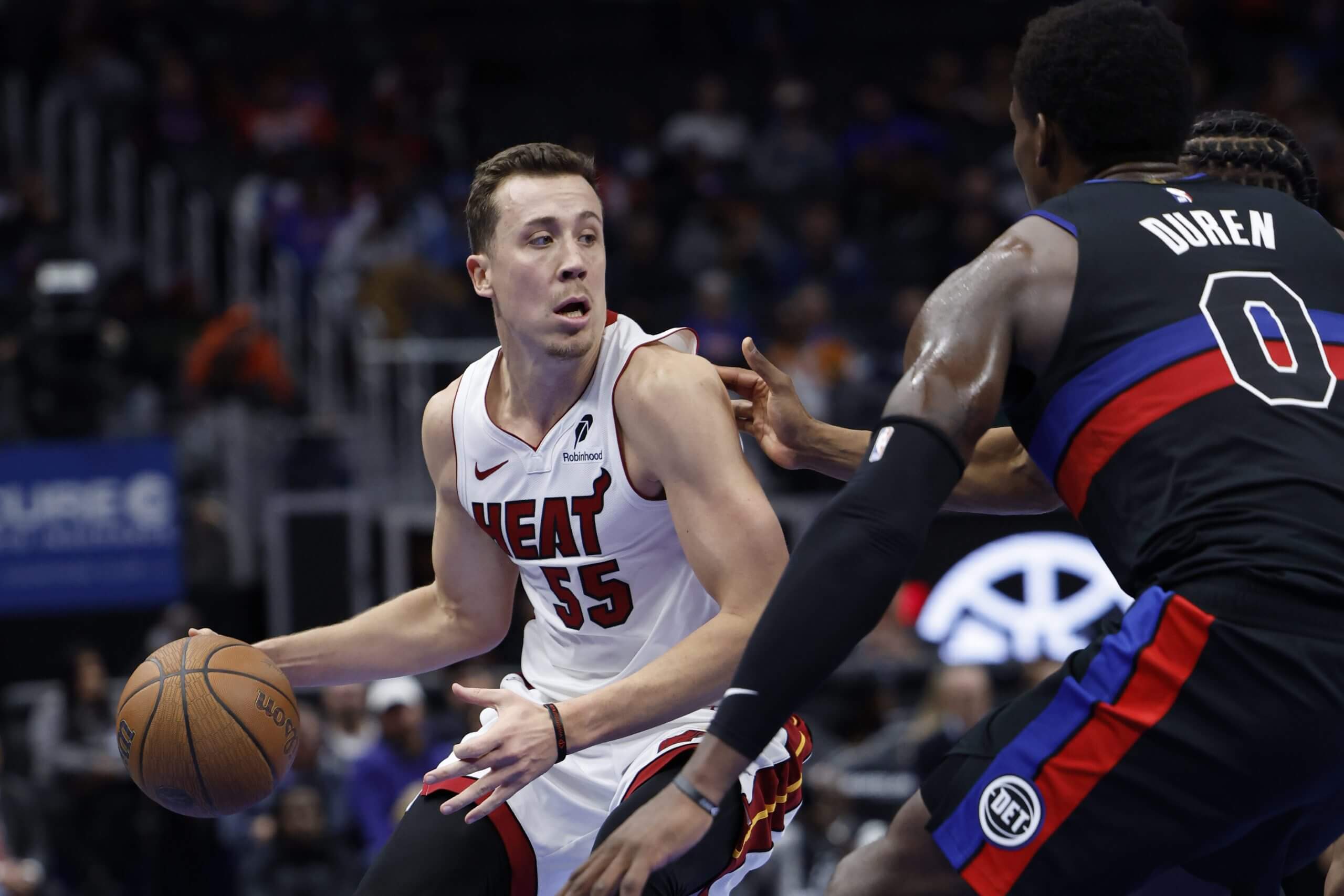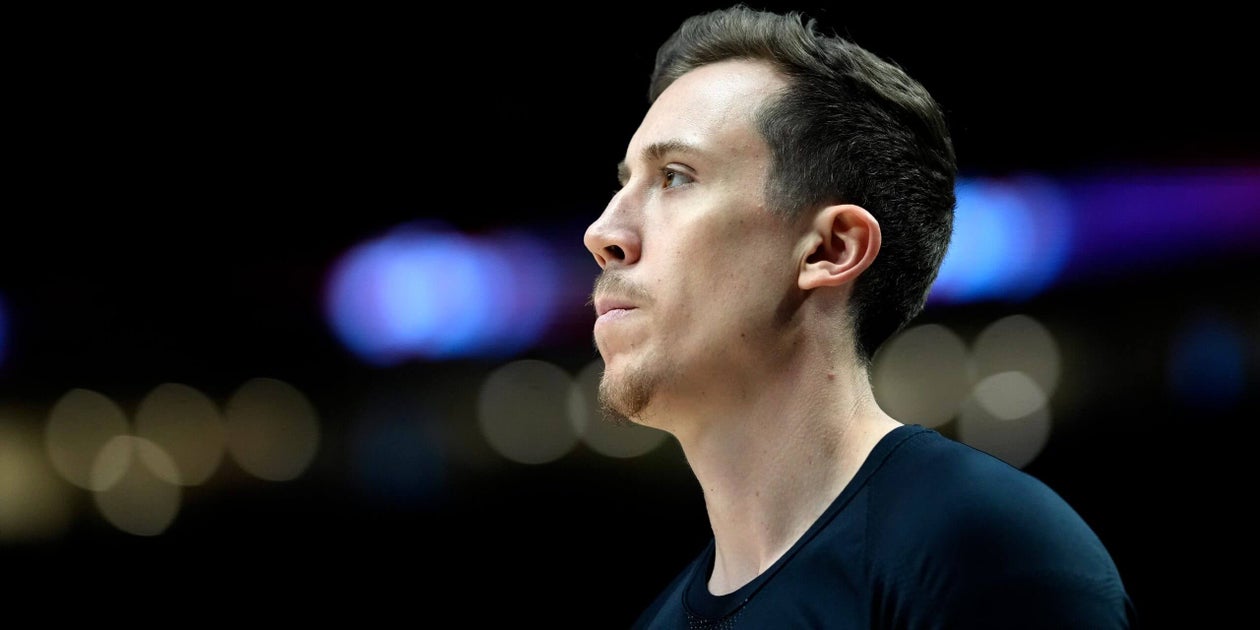Life for Duncan Robinson has been a balancing act. He understands he’s worthy of all the success he’s achieved. But an earlier version of Robinson, the one who struggled to find consistent playing time in high school, still creeps into his mind.
It’s a constant battle, fueled by anxiety, that has allowed Robinson to build an eight-year NBA career after going undrafted in 2018. He’s used it to help him accomplish his childhood dream.
Robinson has long been intimate with anxiety. The two go all the way back to his junior year in 2011 at The Governor’s Academy, where Robinson got inconsistent minutes on his high school basketball team.
He’s well acquainted with uncertainty. He knows the way expectations weigh on a psyche. For Robinson, none of his accomplishments have been able to silence his perpetual angst.
Robinson prefers it that way.
“I’ve always had this anxiety of like, ‘Am I good enough?’” he told The Athletic. “Obviously, I have some God-given talents and abilities. … I sort of feel my superpower has sort of existed in that space of, ‘I haven’t really achieved anything yet.’”
It’s a healthy friction, he believes. A welcomed discomfort keeps him from complacency and pushes him toward progress. Robinson is now embarking on his eighth season after being undrafted. The ink is barely dry on his new three-year, $48 million contract, adding to the $70-plus million he’s already earned. Yet, somehow, he still sees himself halfway up the proverbial mountain. The summit never gets closer.
He’s perennially in the same spot — high enough up to know he can achieve success, yet far enough away from the peak to prevent any real sense of security.
Robinson is acutely aware of his shortcomings. He knows he’s no physical prodigy. His measurables don’t stack up in a league full of athletes. He’s 6-feet-7 and shoots with the best of them. But that’s not enough for ease.
Robinson likes the “razor’s edge,” as he calls it. The feeling that he’s never arrived.
The 31-year-old forward is now 423 regular-season games into his NBA career, has shot 39.7 percent from 3 during that time and has NBA Finals experience. But still, Robinson battles the voice in his head questioning his on-court worth.
After being considered an underdog for the majority of his career, Robinson found himself starting a career-best 72 games in 2020-21. It was the season after he solidified himself as a pillar of the Miami Heat’s rotation.
Robinson’s opinion of himself began changing as well.
“The public perspective shifted my own perspective of myself,” he said. “The challenging part of that was realizing and coming to terms with the fact that a public perception should not be indicative of, or define how I think of myself or the process in which I take to get to the person that I want to be.
“As much as somebody can tell you, ‘Aw, don’t worry about what someone’s saying,’ or ‘Don’t worry about that,’ we’re all human beings. We see and hear things around us all the time. So, working through and getting to the other side of that — of I’m not defined by being an ‘underdog,’ I’m not defined by being ‘overpaid.’ I’m defined by what I show up and do every single day.”

Duncan Robinson will be part of the veteran presence the young Pistons are counting on this season. (Rick Osentoski / Imagn Images)
What Robinson did with his time in Miami was enough for Detroit’s president of basketball operations, Trajan Langdon, to acquire him via a sign-and-trade that sent Simone Fontecchio to the Heat.
Robinson is the second-oldest player on the roster behind 33-year-old Tobias Harris. His reluctance to settle and desire to persevere will be necessary on a team with a median age of 24.6 looking to advance past the first round.
It could become a beneficial partnership for both Robinson and the Pistons. For Robinson, it’s an opportunity to grow into a more expansive leadership role. For the Pistons, the franchise can now gain from his experience.
Robinson brings a wealth of NBA knowledge. He understands what it’s like not getting much playing time. He knows the feeling of hearing his name called as a starter. And the feeling of being relegated back to the bench after being a starter.
“The moments in my career, where on paper, are the biggest accomplishment or the moments where you have everything figured out have been followed by these just gut-punching setbacks,” Robinson said. “And that’s what life is, a lot of times. Everyone can sort of relate to that. It’s not necessarily the fact that you go from a high to a low. But it’s how you respond to it and how you find some equilibrium to find the peace and drive to continue to push forward.”
That peace and equilibrium will be needed in Detroit as one of the few veterans, along with Harris. Robinson’s former Michigan teammate, Caris LeVert, 30, rounds out the veterans.
Robinson said he has worked on his resilience in the same way he works on becoming a better player.
“Having resilience has been, sort of, the calling card of who I aspire to be,” he said. “I’m a big believer in that, learning how to deal with setbacks and challenges is a skill as much as shooting or dribbling. And the skill is honed and acquired through repetition. The only way you can get better at dealing with it is having gone through it.
“So, that’s one area of my career where I feel like I’ve been very fortunate is that from a young age. … I was challenged early on, (asking myself), ‘Is this what you want to do? Is this what you want to be?’ And I always just kept coming back to, ‘Yeah, I mean, this is. I love basketball more than anything. It’s what I do, not necessarily who I am. But in terms of the game itself, it’s given me more than I ever could imagine.”
Sharing knowledge, while also being open to receiving it, is one way in which Robinson is planning to continue to dedicate himself to the game. He is the only Piston who has experienced the intensity of the NBA Finals.
A blend of the knowledge between what Robinson accumulated in his run to the finals, Harris’ 67 playoff games and LeVert’s 25 postseason appearances could prove to be vital on such a young team.
Robinson, who was out with his new teammates for Las Vegas Summer League for the first time since signing, spoke about the Pistons’ youth as what drew him to the team. He also notices a similarity between what he’s been through and what he sees in his new home.
“When I think of a city like Detroit, I think of resilience,” Robinson said. “I think of a city that’s seen the highest highs and the lowest lows, and is still finding a way to bounce back. I think that embodies the people that inhabit it. And that’s very much in tune and in line with everything my career has been.”
After sharing locker rooms with veterans like Dwyane Wade, Jimmy Butler, Udonis Haslem and Andre Iguodala, Robinson is now stepping into a new role. One where he will likely be relied upon in the same way he did with Wade during his rookie season.
At least for Robinson, it helps that he has some familiarity with this group.
“Some crazy games last year,” he said with a laugh. “But the thing that sticks out about this group is their physicality, their toughness and how hard they play. And honestly how they share the ball. That’s the type of system you want to be in. Those are the types of guys you want to be around.”
The belief Detroit has shown by investing in Robinson, to be impactful both on the floor and in the locker room, reaffirms he is good enough. The internal voice pushing Robinson to reach his full potential likely won’t ever fully be silenced.
But it’s now a privilege for Robinson to share his wisdom with the youngest team he’s been a part of.
“At this stage in my life,” he said, “I really just kind of view it as I owe it to a game that’s given me so much.”
(Top photo: Soobum Im / Getty Images)
